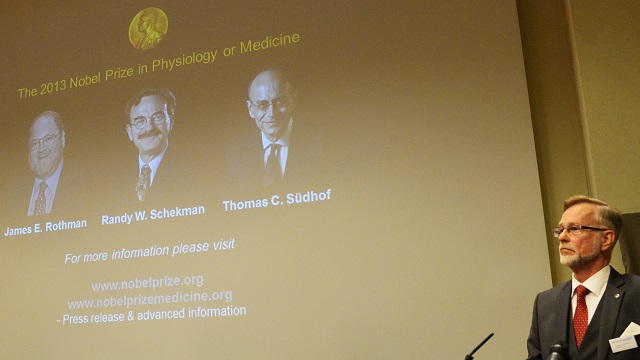
Update 10:30 a.m. Monday: Two Bay Area scientists are part of a trio of researchers to win the 2013 Nobel Prize for Medicine or Physiology for unraveling how cells move major molecules. Sweden's Karolinska Institute announced the prize early this morning for Randy Schekman of UC Berkeley, Thomas Südhof of Stanford and James Rothman of Yale.
In an interview this morning with KQED's Joshua Johnson, Schekman said he planned to use the award as a platform for calling attention to cuts in federal funding for basic scientific research. "I think the biomedical enterprise in the U.S. is in considerable peril as a result of this federal paralysis," he said.
Südhof and Schekman were informed of the award in early-morning phone calls. Before we get to that, here's what the Nobel Prize organization says about the research it's honoring today:
The 2013 Nobel Prize honours three scientists who have solved the mystery of how the cell organizes its transport system. Each cell is a factory that produces and exports molecules. For instance, insulin is manufactured and released into the blood and chemical signals called neurotransmitters are sent from one nerve cell to another. These molecules are transported around the cell in small packages called vesicles. The three Nobel Laureates have discovered the molecular principles that govern how this cargo is delivered to the right place at the right time in the cell.
Randy Schekman discovered a set of genes that were required for vesicle traffic. James Rothman unravelled protein machinery that allows vesicles to fuse with their targets to permit transfer of cargo. Thomas Südhof revealed how signals instruct vesicles to release their cargo with precision.
Through their discoveries, Rothman, Schekman and Südhof have revealed the exquisitely precise control system for the transport and delivery of cellular cargo. Disturbances in this system have deleterious effects and contribute to conditions such as neurological diseases, diabetes, and immunological disorders.
Schekman told us he got the call from Nobel officials at 1:30 this morning. When the phone rang, he said, "My wife called out, 'This is it! This is it!' and I picked it up, and I was kind of shaking. And — but I heard a reassuring, Swedish accent on the other side, offering me congratulations and reassuring me that this was not a hoax call."
Stanford's Scope science blog says Südhof got the word while traveling overseas: "So, where was Südhof when he got the big news? 'I got the call while I was driving [in Spain] and like a good citizen I pulled over and picked up the phone,' he told the Associated Press this morning. 'To be honest, I thought at first it was a joke. I have a lot of friends who might play these kinds of tricks.'" Südhof, like Schekman, also expressed surprise: "I'm absolutely surprised. Every scientist dreams of this. I didn't realize there was chance I would be awarded the prize. I am stunned and really happy. ..."